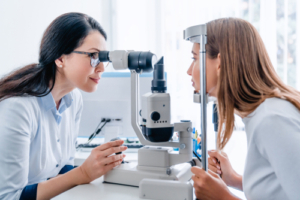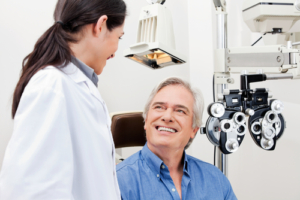How Often Do Adults Need Eye Exams?
Do you wear glasses or contact lenses to see? Even if you don’t, you may still need to see your eye doctor for eye exams.
The number of times you should visit an ophthalmologist or optometrist for an eye examination changes throughout your life. Getting frequent eye exams is about a lot more than having your eyes tested.
It’s a key component of taking care of your general health too. Neglecting one of your most precious senses could make even the simplest activities much harder to accomplish and significantly affect your quality of life.
Keep reading to learn more about how often adults need eye exams.
When Adults Need Eye Exams

The American Academy of Ophthalmology recommends following these baseline guidelines for when adults need eye exams:
- If you have healthy eyes and good vision, see your eye doctor for a complete eye exam once in your twenties and twice in your thirties
- Make sure to see your eye doctor for a complete exam once you’ve turned forty, as this is when vision changes can start appearing
There are exceptions to these recommended frequencies. If you’re more likely to develop eye diseases or you already have eye conditions such as high blood pressure and diabetes, you’ll require more regular visits.
You’ll also need to see your eye doctor once a year if you need to wear glasses or contact lenses to see. Those that wear visual aids have refractive errors like nearsightedness, farsightedness, and astigmatism.
If you use these aids, it’s necessary to schedule regular eye exams to ensure your prescription stays up to date. It can be dangerous to walk around with an outdated prescription, so seeing your eye doctor every year ensures that your eyes are healthy.
Other individuals with an elevated risk of eye problems include those:
- Who have a family history of eye diseases
- With a high refractive error or prescription
- Currently taking medications that can affect their vision
- Who previously had a laser vision correction procedure like LASIK
- Who have had an eye injury in the past
If you know that you’re more prone to certain eye conditions, your ophthalmologist will tell you how often you should come in for eye exams. It’s imperative to follow any instructions from your eye doctor to avoid the potential for vision loss.
Vision Changes That Need an Eye Exam Right Away
Some symptoms demand immediate attention to avoid sight-threatening complications. Whether you’ve recently had your eye exam or you aren’t yet due for your next one, if you develop any of the following, seek help from your eye doctor as soon as you can:
Sudden Eye Pain
Abrupt pain in your eyes accompanied by redness, nausea, and vomiting could be an indication of glaucoma, a vision-robbing disease. It can also be a sign of having an infection, so make sure you see your eye doctor to help determine the cause of your eye pain.
An Increase in Flashes or Floaters
There’s nothing out of the ordinary about seeing flashes and floaters from time to time. However, if you notice a sudden increase in them, this is out of the ordinary.
Seeing more flashes and floaters can be a warning sign of a retinal tear or detachment. If you have a retinal detachment, you should have it treated as soon as possible, as it’s considered a medical emergency. If left untreated, it could result in irreversible vision loss.
Eye Injury
An eye injury caused by a chemical burn or a foreign body stuck inside needs medical attention fast. When left untreated, some eye injuries could lead to permanent blindness.
Straight Lines Appearing Wavy

Experiencing distorted vision or seeing a dark area in your central vision can be a tell-tale sign of age-related macular degeneration (AMD). Age-related macular degeneration is a leading cause of vision loss in seniors.
AMD is one of the things that your eye doctor will check for when you go in for your eye exam. Your risk for developing age-related eye conditions increases as you get older.
Diabetes
If you have diabetes and experience blind spots, blurred vision, and floaters, that could signal diabetic retinopathy. If you have diabetes, you should see your eye doctor more regularly, as it does increase your risk of developing conditions like cataracts early on. Having higher blood sugar levels could also lead to diabetic retinopathy.
The Importance of Regular Eye Exams
Below are some of the reasons regular eye exams are vital:
To Improve Your Vision
At your eye exam, your eye doctor will look at how your eyes function, as well as how healthy they are. Knowing how your eyes function, inside and out, aids in accurately diagnosing symptomless eye diseases like cataracts, age-related macular degeneration, and glaucoma.
Detecting these conditions early on is essential for early treatment and is the only way to prevent further vision loss. Monitoring and managing these conditions ensures that you can preserve your remaining vision. When you have problems with your vision, not getting treatment fast enough exacerbates the problem.
Keep A Close Watch on Your Overall Health

Getting frequent eye exams can help diagnose other health problems like high blood pressure, diabetes, high cholesterol, lupus, thyroid disease, tumors, and certain cancers. Timely detection of diseases allows doctors to provide prompt treatment, increasing the chances of successful outcomes.
Seeing their eye doctor may be the only doctor they see all year for some patients. In some cases, an early diagnosis could help save someone’s life.
When Was Your Last Eye Exam?

Taking care of your eyes is critical to your safety, health, and quality of life. Seeing your eye doctor for regular eye exams is necessary for all adults, even if they don’t need to wear glasses or contact lenses to see.
At Eye Consultants of North Dakota, our team of compassionate eye doctors is here to provide comprehensive eye exams to protect and preserve your vision. Take the first step towards having healthier eyes by scheduling an eye exam at Eye Consultants of North Dakota in Fargo, ND, today!



